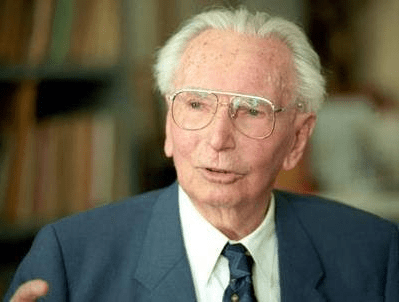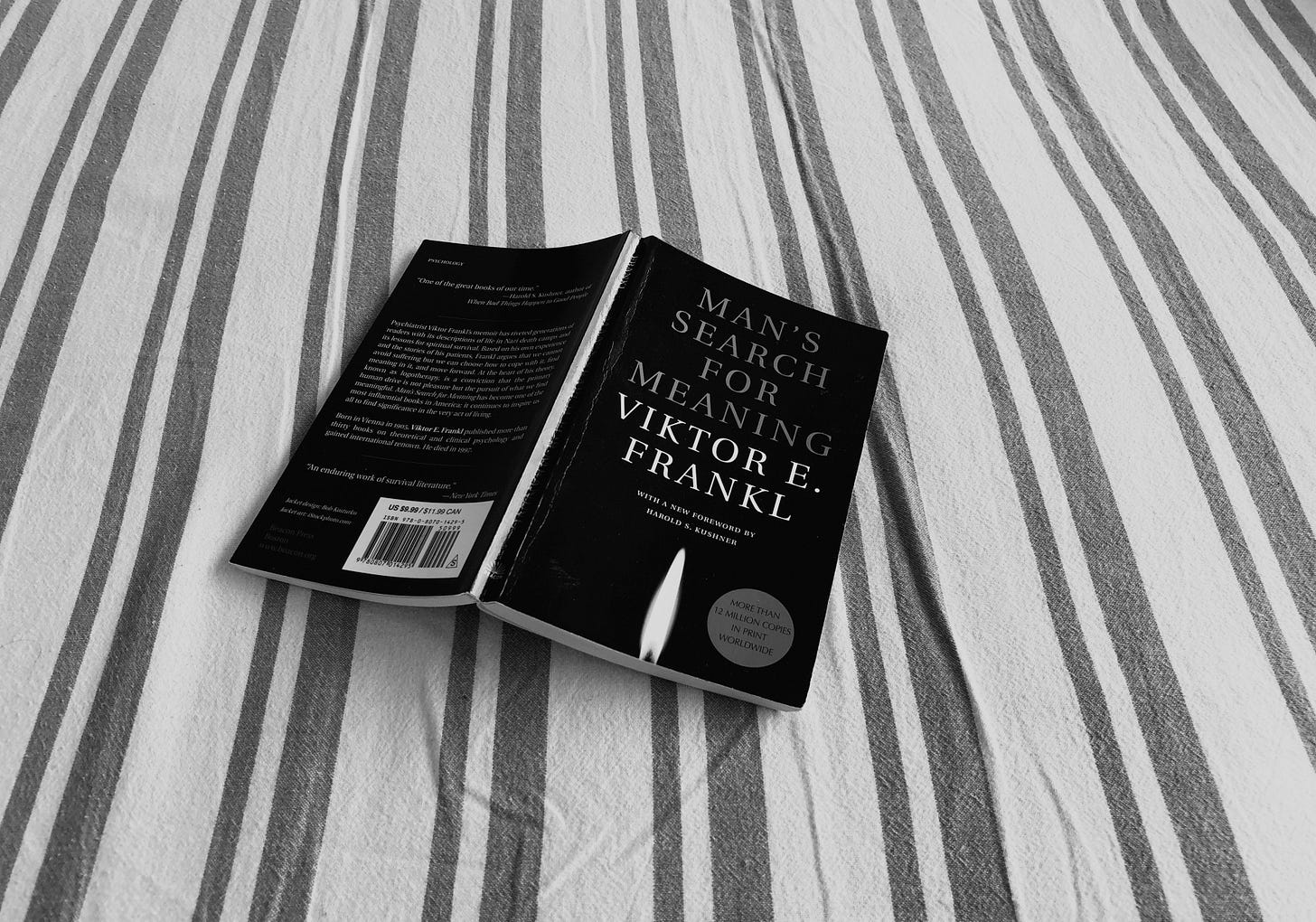Finding Meaning and Purpose in Calamity
Lessons from Viktor E. Frankl's Man's Search for Meaning

“Sometimes the situation in which a man finds himself may require him to shape his own fate by action.” — Dr. Victor E. Frankl, Man’s Search for Meaning
Since time immemorial, life has gone sideways. No matter the era, no matter the nationality, no matter the ethnicity, no matter the religion or lack thereof, people cannot escape their lives going FUBAR at least once or twice during their existence. The only constant in life is inconsistency.
Despite how this truth connects every human being on the only planet we will ever live on, it doesn't ease the anxiety, anger, depression, annoyance, pessimism, sadness, isolation, grief and terror of living in a violent and uncertain world. Too often we don't work together to support and save each other though we all get sick, though we all bleed and die. Humanity has not fully evolved. Yet.
And if you are an American like me, our country’s Mump-Nazi pandemonium quickens the swirl of a world unraveling from climate change, war, genocide, political repression. A terrorizing swirl that has made fascism and autocracy attractive.
People prefer a draconian and cruel totalitarian to provide what they think is stability. We seem to have forgotten that history proves otherwise. A portion of the world population still believes an internally wounded philistine and merciless strongman will save them and keep them safe. It hurts me to know this about some members of the human race.
Once again, I turn to books for solace. In previous posts, I recommended Victor E. Frankl’s Man’s Search for Meaning though I had not entirely read his most famous text. After reality and dread knotted my guts in early March, I finally completed a deep read.
Frankl divided his classic and profound opus into two parts, My copy also includes a foreword composed by Harold S. Kushner who wrote When Bad Things Happen to Good People and a 1992 introduction and 1984 afterward from Frankl.
During the first half, Frankl narrates his life in Nazi concentration and death camps. The second half is more clinical. This is where he explains his logotherapy that helps patients find purpose in their life through “a will to meaning.” 1

Frankl argues that logotherapy allows people to find and embrace their individual purpose and meaning through
love
work or vocation
deeds
service
truth
experience
nature
action
culture
art
sacrifice
suffering

Though Frankl’s second wife was a devout Roman Catholic—a faith that views suffering as a way for Christians to move closer to God—he remained an observant Jew after his liberation. He knew firsthand that misery remains part of human existence no matter how much one may try to avoid it. Through suffering, Frankl believes we can find meaning by enduring it.
He asserts that a difficult or nightmarish situation forces human beings to personally grow and develop. Suffering alters and deepens perspective and resilience; even if people cannot affect change in a hopeless situation, they still remain witnesses to it and other humans who continue the work to turn despondency into hope.2 Suffering reveals what we could not see before.
Based on what he observed as a scientist and a prisoner, Frankl analyzed the psychology and actions of his fellow concentration camp inmates —including kapos and other prison functionaries. He noted how all these men changed during their shared brutal circumstances.
Out of self preservation, some of his fellow prisoners became as cruel as the Nazi guards to gain protection and regain some sense of control and agency.3 Others blunted their feelings and empathy to create “a very necessary protective shell.”4 Others gave up and waited for death.5

As he and his fellow prisoners lived in Hell on earth, Frankl realized he had to give his pain purpose. Sometimes to do so, he had to “find a sense of humor” in the scarcity of joy.6
He used his work and psychiatric knowledge for one of his purposes. He medically treated sick and dying prisoners. Before the Nazis took him to his first concentration camp, he hid the book he had just written beneath his clothes. After the Nazi guards found his manuscript and destroyed it, Frankl kept the rewriting and development of a new manuscript once freed as one of his purposes for living.
His other meaning for living was his first wife. While he did not know if his wife remained alive in another camp, he kept the possibility of reuniting with her fresh in his thoughts After he learned that his wife had perished in her camp, Frankl funneled his purpose into his psychiatric practice, writings and lectures.

Before The Allies liberated his camp, Frankl would gaze at the evening stars and
cl[i]ng to [his] wife’s image, imagining it with an uncanny acuteness. [He] heard her answering [him], saw her smile, her frank and encouraging look. Real or not, her look was then more luminous than the sun which was beginning to rise.
. . . The truth—that love is the ultimate and the highest goal to which man can aspire. Then [he] rasped the meaning of the greatest secret that human poetry and human thought have to impart: The salvation of man is through love and in love.
Frankl said meaning and purpose are different for every person, but no matter how dire life is or how confused or depressed we may be, we can find meaning and purpose in our lives. According to Frankl, doing so will help us during challenging and dangerous times and in times of peace and bliss.
Since life is inconsistent, it also means that horrific times do not last forever. History has shown that change is not always for the worst. Many times of positive change have arisen from difficult times and what we have learned from those challenges.
The wheel of change has advanced mankind and our connection with one another. From finding meaning and purpose in our lives, we can achieve a new reality where we nurture instead of destroy one another, save instead of sacrifice one another.
Viktor E. Frankl, “Logotherapy in a Nutshell,” 1959. Man’s Search for Meaning, Boston: Beacon Press, 98-99.
Frankl, “Logotherapy in a Nutshell,” 112.
Viktor E. Frankl, “Experiences in a Concentration Camp,” 1959. Man’s Search for Meaning, Boston: Beacon Press, 3-4; 10-11.
Frankl, “Experiences in a Concentration Camp,” 23.
Frankl, “Experiences in a Concentration Camp,” 20.
Frankl, “Experiences in a Concentration Camp,” 43.








I am dumbfounded that so many Americans do not see the parallels between what happened to Frankl and what is happening to people being kidnapped and trafficked to El Salvador.
This is must reading.